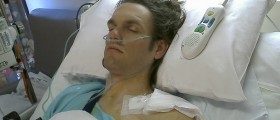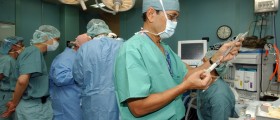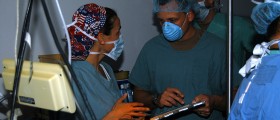
General Anesthesia
General anesthesia is applied during majority of surgical procedures to stop the pain. Anesthetics are medications which successfully block pain signals from being carried to the brain. Thanks to general anesthesia, and other types of anesthesia, doctors can perform every single intervention painlessly. Additionally, during general anesthesia patients are asleep so they are not even aware of what is going on around them.
Unfortunately, this type of anesthesia is not suitable for all patients. Some patients with certain comorbidities may experience devastating complications if they are subjected to general anesthesia. This is why each and every patient undergoes thorough examination prior the surgery and the surgeon decides which type of anesthesia will be the most suitable.
Normal Reactions after General Anesthesia
Normally patients feel sleepy and disorientated for about 15 minutes after wakening. Patients may also complain about sore throat and feel sick. Still nausea is eliminated by proper medications. Since the effects of anesthesia wear off gradually, the patient may complain about pain and is then given proper painkillers.
Risks and Side Effects of General Anesthesia
Medications that are used in general anesthesia have certain undesirable side effects.
One of the possible side effects is depression of central nervous system. It may occur if higher doses of medications are administered. Depression of central nervous system may reflect to respiration and even cause death.
General anesthesia leads to a decrease in cardiac output. Additionally, it causes drop in blood pressure. So the heart contractions reduce in intensity. The heart may even stop.
Respiratory depression is another possible complication of general anesthesia. Anesthetics lead to a loss of muscle tone, reduce their contractility and receptors in the lungs become less sensitive to the level of oxygen and carbon dioxide.
During general anesthesia the body loses control over temperature and cannot regulate it properly. This features with decrease in body temperature and it results in shivering after patients wake up from general anesthesia.
General side effects of anesthesia are feeling of sickness and vomiting. Sore throat is actually a consequence of intubation. Endotracheal tube irritates the trachea and irritation leads to pain and hoarseness. Headaches may also occur. And finally, patients may feel exhausted and confused for a few days after the surgery.
Serious complications of general anesthesia are rather rare and they include damage to teeth, lips or tongue. These organs can be damaged during intubation. Nerve damage is also possible. Furthermore, some patients may suffer from urinary retention.
And finally, allergic reactions are the most serious. Allergic reaction may be in a form of rash and in most extreme cases anaphylactic shock may develop. However, the last complication is rather rare since patients do report allergy to medications prior the surgery and application of general anesthesia.
















Your thoughts on this
Loading...